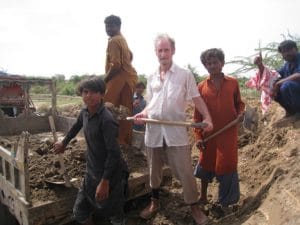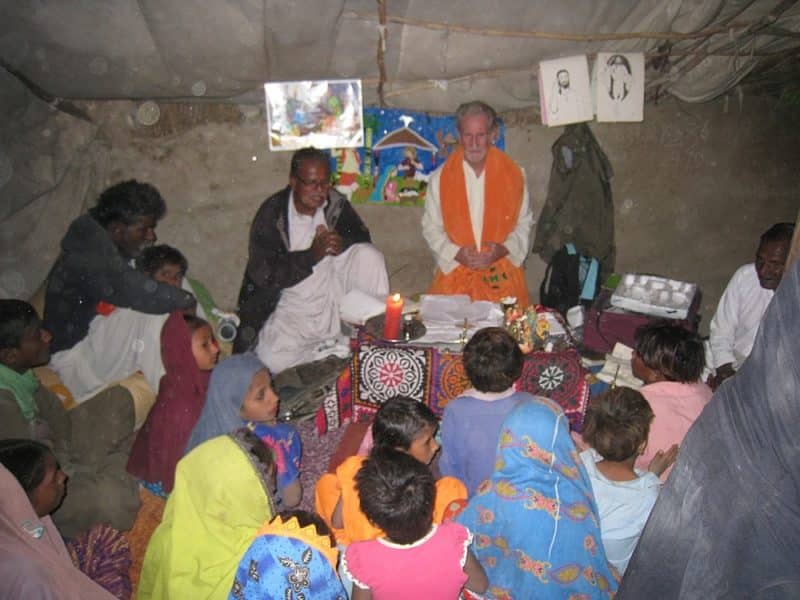In the late 1970s, a young dairy farmer from Hokitika was leafing through the Far East magazine, published by the St Columban’s Mission Society, and saw an advertisement for “young, adventurous Kiwi men”.
It was a call for vocation, said Fr Daniel O’Connor, a call that he answered “yes” to.
“I got in touch with the Columbans and they accepted me. I went to their seminary in Sydney for training. During that time, I found, even though I had been happy where I’d been in a valley in New Zealand working in a farm, I found a deeper peace in a [Columban College] seminary,” he said. “I felt peace in following God’s call.”
Fr O’Connor said, as a seminarian, he was asked to name three countries that he would like to serve in as a missionary. His first answer was “Pakistan”.
“I heard it was rural, with people living in villages. With my farming background, I felt solidarity with peasant farmers. Also, it was a new mission for the Columbans,” he said, explaining that the mission was founded in 1979. He went there in 1983 as a seminarian to study the Urdu language and to prepare for the mission.
Pakistan, known as the “Land of the Pure”, is a land of contrasts, Fr O’Connor said, “from the sizzling hot, dusty, summer plains of the Sindh, to the mighty mountains in the north, where the second highest mountain, K2, towers into the sky”.
There was widespread poverty then, and there still is.
“The people were very poor. A lot of them were in bonded labour, as well as peasant farmers working for landlords. There were people who did the sanitary work, and they are seen as ‘low caste’,” he said.
But he also saw “the goodness of the people, the simplicity of life and the strength of faith”.
“People remember God very much in Pakistan. The Christians are called to prayer. And the Muslims are called to prayer five times a day,” he observed.
Five priorities
Fr O’Connor explained the Columban Missionaries have five priorities in terms of their mission: (being) at the service of, and formation of, the local church, to help build up/establish, and then to move on; solidarity with the poor; tribal apostolate; justice and peace and the integrity of creation; and inter-faith dialogue.
“This requires one to cross over boundaries of culture, climate, language, food and religion. To follow the call to try [to] help to make the reign (and/or) kingdom of God a better reality,” he said. “The tribal people mainly live and work as landless peasant farm workers in the many villages scattered throughout the parish. They are at the mercy of the landlords, who are, in the main, rich and powerful.”
Education is the key, Fr O’Connor said, to escape poverty.
“Some of the people have, therefore, through good education, obtained good jobs as teachers, nurses etc.. Some have also escaped from the feudal system and obtained jobs in factories in the large city of Karachi,” he said.
The mission has a school in its church compound in Badin with about 420 students. He said that one- third of the students are Christians, another third are Muslims and a third are Hindus.
“That’s a good way of interfaith dialogue. They [the students] become friends with one another, and also their parents [become friends]. They will remember the feasts of the Christians, and also the feasts of the Hindus, and also the Muslims,” he said.
The mission also runs the health clinic, which treats tuberculosis patients, as well as providing care for mothers and their children.
“Because of poverty and injustice, there are too many sick people, resulting in many ‘dying before their time’,” he said.
The diet of the people in this area is poor, which also causes poor health. Fr O’Connor said that the mission bought goats and delivered them to poor widows and needy families. The goats supply them with fresh milk, and the kids from the goats are raised and sold to provide income.

Fr Daniel with a buffalo he bought after a traffic incident — and its calf — that now help the village.
“One morning, while driving the jeep, I ran into a buffalo. The owners insisted that I had to purchase this buffalo. Being an old dairy farmer, I knew that it was not badly injured,” he said.
He bought the buffalo. “It is being cared for by poor people in a village where it has produced a calf and they are being nourished by the milk,” he said.
Security
Fr O’Connor said he does sports and cycling, but it is a little difficult because of security.
“Until the last few years, Karachi was regarded as being one of the most dangerous cities in the world. With government action, and the help of armed police and military, it has become a much safer place to live,” he said.
Still, churches are heavily guarded, particularly around Christmas and Easter to prevent terrorist attacks.
Call to mission
Fr O’Connor has spent 26 years of his life as a missionary in Pakistan. He came back home in July last year, and returned to Pakistan in December.
“It’s feels good to come here and go back again. To be a missionary, you have to deal with leaving the country of your birth. You become at home and you are not at home in each of the countries, for me, in Pakistan or New Zealand,” he said.
He said it is a “very enriching and very challenging” call.
“There is a saying also, ‘when you go to another country, another culture, another faith, take off your shoes because the place there is holy. The spirit of God has been there centuries before you’ve gone’,” he said.
He encouraged young men to say “yes” to the call to become a missionary.
“You’ll learn more about the mystery of life and the mystery of God. It is very fulfilling,” he said.

Reader Interactions